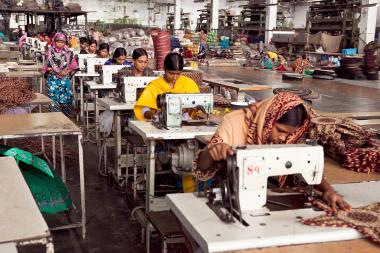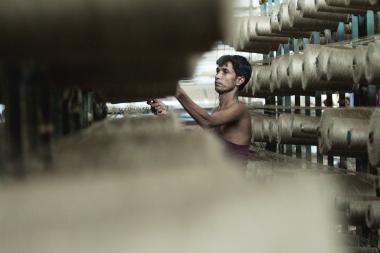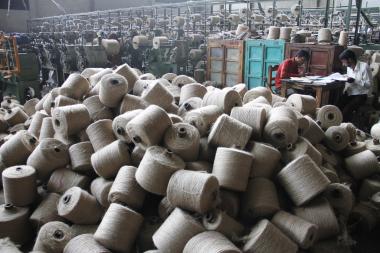Cabinet passes Draft on German Supply Chain Act
Passed on March 3, 2021, it will become effective as of Jan. 1, 2023 - the Supply Chain Act for companies with more than 3,000 employees. The draft law on corporate due diligence in supply chains - The Supply Chain Act - decided by the German Cabinet is expected to be finalized by the German Bundestag before the summer break.
With the fire at a textile factory in Pakistan in 2013, which claimed more than 250 victims, the topic of supply chain management and sustainable procurement received a great deal of publicity and was placed on the political agenda at various levels: companies can relocate their production abroad - but not their responsibility.
In recent years, a number of measures have been taken worldwide to improve the situation in global value chains. In particular, this involves compliance with human rights, social issues and environmental protection. However, the results are sobering: According to the BMZ (Federal Ministry for Economic Cooperation and Development), 25 million people are currently in forced labor, and 75 million boys and girls worldwide are affected by exploitative child labor.
But where does responsibility begin, and where does it end? The recently passed draft law on corporate due diligence in supply chains is a compromise decision by the ministries involved for development, labor and economy.
Experts from the accredited certification organization GUT Certification Company for Management Systems in Berlin have compiled key statements and estimations:
Which human rights do the due diligence obligations relate to?
- Integrity of life and health
- Freedom from slavery and forced labor
- Protection of children and freedom from child labor
- Freedom of association and the right of collective bargaining
- Protection against torture
- Fair working conditions (occupational health and safety, breaks)
- Environmental obligations to protect human health
Circle of affected companies located in Germany and deadlines:
- From 2023: Companies with more than 3,000 employees (over 600 companies in Germany)
- From 2024: Companies with more than 1,000 employees (2,900 companies)
Obligations in the value chain
In addition to the affected companies' own business operations, responsibility initially extends only to their direct suppliers and service providers. Within the framework of risk management, adverse effects on human rights and environmental due diligence obligations are to be identified and documented in corresponding risk reports.
As long as there are no concrete indications of human rights violations, the monitoring of indirect suppliers is not the responsibility of the companies involved.
The documents are to be checked by the Federal Office for Economic Affairs and Export Control (BAFA). In the event of violations of the law, companies will initially face sanctions in the form of fines, however, in the event of serious violations, they may also be excluded from the granting of public contracts.
Overall, the "Act on Corporate Due Diligence in Supply Chains" does not provide for a duty to succeed or a guarantee liability, but primarily requires the companies involved to take measures within the framework of an "obligation of efforts".
The law does not provide for civil liability for any human rights violations in the supply chain. However, in the event of violations of human and labor rights, foreign employees are to be given the opportunity to be represented by trade unions and before German courts.
What does a company need to do in its own business unit and with its direct supplier?
Companies must implement the following measures:
- Pass declaration of principles on respect for human rights
- Risk analysis: establish and implement procedures to identify adverse human rights impacts
- Risk management (incl. corrective measures) to prevent potentially negative impacts on human rights
- Set up complaints mechanism
- Report transparently and publicly
- In the event of a violation, corrective measures must be taken immediately in the company's own business area, and it is imperative that these measures lead to the termination of the violation. In addition, further preventive measures must be initiated
- If the violation with the direct supplier cannot be terminated in the foreseeable future, a concrete plan for minimization and avoidance must be created. Appropriate measures must be taken for this purpose, starting with supplier development within a defined time frame and ending with the discontinuation of the business relationship.
What does a company have to do with the indirect supplier?
Here, the due diligence obligations only apply on an occasion-related basis. If the company becomes aware of a possible violation by an indirect supplier, it must immediately:
- Carry out a risk analysis
- Implement a concept for minimization and prevention
- Establish appropriate preventive measures regarding the causer of the violation
Is that a breakthrough? Barely.
With the aim of improving the human rights situation along the supply chain of German companies and thus implementing the UN Guiding Principles on Business and Human Rights, the German government passed the National Action Plan on Business and Human Rights (NAP) back in 2016. This urged companies to review their business activities and relationships with regard to human rights risks and implement necessary measures - on a voluntary basis.
However, the German government's report was sobering. For example, the monitoring of the implementation status of the NAP's requirements carried out from 2018 to 2020 revealed, that less than 20% of the German companies surveyed have voluntarily fulfilled their human rights due diligence obligations to date.
Now, ethical obligations are becoming part of the compliance, at least for the big companies in Germany. The majority of the "giants" involved are already familiar with the obligation under the EU Conflict Minerals Regulation and/or the EU CSR Directive: Corporate responsibility in the supply chain is a mandatory part of non-financial reporting. However, the materiality view here is defined by size of loss and not the topicality of the problem in the supply chain.
What does the new law change? With the law passed, everything remains the same for now: Digging in deeper and developing one’s own supply chain is still not mandatory.
Status Quo
From experience in validating sustainability reports, GUTcert auditors see that many German companies of various sizes are already addressing sustainability concerns in the supply chain based on their own corporate sustainability and ethical obligations:
The introduction of a code of conduct for business partners is already part of everyday life in many companies. When contracts are listed for the first time and renewed, the direct suppliers and service providers must adopt certain obligations and carry them forward into their own value chain.
Documentation of the risk analysis and its results as required by law is also no longer a novelty. At the latest in the context of conventional economic concerns, it is no longer possible to imagine supply chains without risks. The pandemic had brought this topic even more into focus in the light of interrupted supply chains in many places. Many companies have already expanded the purely economic risks to include sustainability-related issues, i.e. environmental and social concerns, human rights clauses and anti-corruption rules.
What is often missing, however, is an effective monitoring of the respective performance of the business partners. Self-reporting is the common tool in demonstrating sustainability in the supply chain. On-site controls are linked with high costs and often with the lack of knowledge about the possible means of a sustainability management. Some risks therefore often remain "blind spots".
What to do?
A matrix of one's own corporate sustainability risks of the value chain related to countries, industries and products is a first step in the right direction. With or without the law: The important thing is to take a serious look at your own supply chain and set the boundaries, so that existing risks of violation can actually be addressed - step by step. This way, any company can work out the key risks and opportunities with manageable effort. Help is provided by some internationally recognized sources that can serve as a basis for risk evaluation.
Targets and measures should be derived from the main risks and opportunities. These can range from the company's own controls and association work in its own industry to cooperation with international organizations, platforms and certifications. There are many options if one is looking for them.
GUT Certification Company for Management Systems




